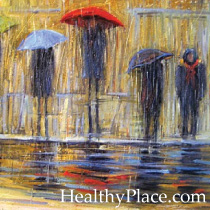A Lesson Learned From a Random Stranger
I once read a book by a homeless man, and he talked about the first thing his guru said to him: "Everything that happens to you is for your own good."
As a rape survivor, I argue with this, but it stood out to me. My version would be "Everything that happens to you is to teach you something." I recently learned a major fact about my BPD diagnosis from a woman at the bus stop.
What Happened at the IndyGo Stop
 Indianapolis was once named the sixth-most mentally unhealthy city in the nation and, for some reason, our residents with mental illness are attracted to the IndyGo bus system. When a woman suddenly screamed "Plead the blood of Jesus! Woo!", I gave her a brief glance, convinced that she had a mental illness, then returned to waiting for the bus. Suddenly, someone screamed, and I turned just in time to see her fall to the ground and begin convulsing. A small crowd gathered around, staring. Someone cried out for someone to do something and I stepped forward. I did what first aid I knew since she was bleeding, told a bystander to call 911 to report a bleeding woman having a seizure, and waited. The EMTs came, said they got called on her all the time, then escorted her to the ambulance. I caught my bus and went to my destination somewhat shaken up.
Indianapolis was once named the sixth-most mentally unhealthy city in the nation and, for some reason, our residents with mental illness are attracted to the IndyGo bus system. When a woman suddenly screamed "Plead the blood of Jesus! Woo!", I gave her a brief glance, convinced that she had a mental illness, then returned to waiting for the bus. Suddenly, someone screamed, and I turned just in time to see her fall to the ground and begin convulsing. A small crowd gathered around, staring. Someone cried out for someone to do something and I stepped forward. I did what first aid I knew since she was bleeding, told a bystander to call 911 to report a bleeding woman having a seizure, and waited. The EMTs came, said they got called on her all the time, then escorted her to the ambulance. I caught my bus and went to my destination somewhat shaken up.
I later talked to a woman who has been a nurse for 30 years and she said my reaction was normal. She said that even nurses get shaken up by seizures. She said I did the right thing first aid-wise and that I was a hero for taking action. I then began to think about the situation and what I had learned from it.
What I Learned
There are few situations in the world in which one feels more helpless than when waiting for the ambulance to arrive. I discovered that I don't like feeling helpless. Why? Because it reminds me of past trauma. It reminds me of times I couldn't protect myself or take action to help myself. These situations were very painful and led to my development of post-traumatic stress disorder (PTSD) and borderline personality disorder (BPD). So it makes sense that being in a situation where I feel helpless triggers my urge to use negative coping skills such as drinking alcohol or self-injuring.
I wished I could be like the other people at the bus stop, who I thought just shrugged this off instead of getting upset. Then I told myself that I didn't know how they felt or how they reacted. Maybe they felt similar to me; I don't know. What mattered was what I felt and how I reacted. I also told myself that I was the only one who helped--did I really want to be a person who just stands around and stares like a slack-jawed idiot? The answer to that was no. So I concluded that I didn't really want to be like the other people at the bus stop, and that I was okay with my actions. And since I was okay with my actions, there was no need to punish myself.
What This Means
I now have a new insight into my condition. I can be on guard against future situations in which I might feel helpless, such as a current battle with the government over my food stamps. I can understand why I want to drink or cut, and use this understanding to talk myself out of it. I can recognize why my symptoms are worse than normal and articulate the problem to myself and to my treatment team. To me, this is a big lesson.
Everything that happens to you can teach you something.
APA Reference
Oberg, B.
(2013, March 27). A Lesson Learned From a Random Stranger, HealthyPlace. Retrieved
on 2026, March 4 from https://www.healthyplace.com/blogs/borderline/2013/03/a-lesson-learned-from-a-random-stranger
Author: Becky Oberg
Hi Becky,
Thank you for this. The insights that come to me from ordinary life, unexpectedly, are often the ones that are the deepest and most useful. Being helpless in a situation, or just feeling helpless, also sets off my extreme anxiety and self-injury. Helplessness, along with sleep deprivation, was a large part of why my last hospitalization was so traumatic for me. The trauma doesn't ever just go away either, so I need to avoid situations of extreme helplessness and/or lack of sleep. (BTW, my son has seizures and my husband panics every time. They are so dramatic it's very scary.)